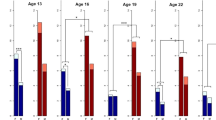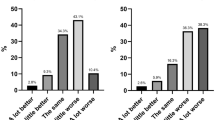Abstract
The Tendency to Forgive Scale is a self-reported instrument for measuring dispositional forgiveness. Although the TTF has been used in many countries, few studies systematically examined the psychometric properties of the TTF in Chinese adolescents. The purpose of this study was to verify the construct and criterion-related validity of the Tendency to Forgive Scale in Chinese adolescents and assess its measurement invariance across gender and rural-urban groups. The current sample included 501 Chinese high school students. In this study, Cronbach’s α coefficient of the TTF was 0.61. Confirmatory factor analysis indicated that the factorial structure of the Tendency to Forgive Scale had a good model fit (χ2(2) = 2.94, p > 0.05, CFI = 0.995, SRMR = 0.018, RMSEA = 0.031, NNFI = 0.986), and multi-group confirmatory factor analyses proved that measurement invariance held across gender and rural-urban groups. Furthermore, the scale had good criterion-related validity in relation to life satisfaction, positive affect and negative affect and these relationships were not modulated by gender and residence, In conclusion, these findings indicated that the Tendency to Forgive Scale would be a reliable and valid tool to assess dispositional forgiveness in Chinese adolescents.

Similar content being viewed by others
References
Barcaccia, B., Pallini, S., Baiocco, R., Salvati, M., Saliani, A. M., & Schneider, B. H. (2018a). Forgiveness and friendship protect adolescent victims of bullying from emotional maladjustment. Psicothema, 30(4), 427–433.
Barcaccia, B., Pistella, J., Baiocco, R., Pallini, S., Saliani, A. M., Mancini, F., & Salvati, M. (2018b). Forgiveness and religious practice: A study on a sample of Italian preadolescents. Journal of Beliefs & Values, 39(2), 223–232.
Barcaccia, B., Salvati, M., Pallini, S., Baiocco, R., Curcio, G., Mancini, F., & Vecchio, G. M. (2019). Interpersonal forgiveness and adolescent depression. The mediational role of self-reassurance and self-criticism. Journal of Child and Family Studies. Advance online publication.
Berry, J. W., Worthington, E. L., Parrott, L., Connor, L. E. O., & Wade, N. G. (2001). Dispositional forgivingness: Development and construct validity of the transgression narrative test of forgivingness (TNTF). Personality and Social Psychology Bulletin, 27(10), 1277–1290.
Bollen, K. A. (1989). Structural equations with latent variables. New York: John Wiley and Sons, 1989, 35(7), 289–308.
Bono, G., Mccullough, M. E., & Root, L. M. (2008). Forgiveness, feeling connected to others, and well-being: two longitudinal studies. Personality and Social Psychology Bulletin, 34(2), 182–195.
Brown, R. P. (2003). Measuring individual differences in the tendency to forgive: Construct validity and links with depression. Personality and Social Psychology Bulletin, 29(6), 759–771.
Brown, R. P., & Phillips, A. (2005). Letting bygones be bygones: Further evidence for the validity of the tendency to forgive scale. Personality & Individual Differences, 38(3), 627–638.
Byrne, B. (2010). Structural equation modeling with AMOS. Basic concepts, applications, and programming (2nd ed.). New York: Taylor & Francis Group.
Cabras, C., Loi, G., & Sechi, C. (2017a). Assessment of dispositional forgiveness in adolescence: A contribution to the Italian validation of the forgiveness likelihood scale. Mental Health, Religion and Culture, 20(9), 888–897.
Cabras, C., Loi, G., Sechi, C., & Mondo, M. (2017b). Relationship amongst mood, propensity to forgive, and mental-health problems in female Italian adolescents. Mental Health, Religion and Culture, 20(8), 800–811.
Cabras, C., Loi, G., & Sechi, C. (2018). Testing the factor structure of the forgiveness scale among Italian adolescent students. Mental Health, Religion and Culture, 22(6), 580–590.
Cheung, G. W., & Rensvold, R. B. (2002). Evaluating goodness-of-fit indexes for testing measurement invariance. Structural Equation Modeling, 9(2), 233–255.
Curran, P. J., West, S. G., & Finch, J. F. (1996). The robustness of test statistics to nonnormality and specification error in confirmatory factor analysis. Psychological Methods, 1(1), 16–29.
Diener, E. (1994). Assessing subjective well-being: Progress and opportunities. Social Indicators Research, 31(2), 103–157.
Diener, E., & Suh, E. (2000). Culture and subjective well-being. Champaign: MIT Press.
Eaton, J., Struthers, C. W., & Santelli, A. G. (2006). Dispositional and state forgiveness: The role of self-esteem, need for structure, and narcissism. Personality & Individual Differences, 41(2), 371–380.
Eder, L., Thavaneswaran, A., Chandran, V., & Gladman, D. D. (2013). Gender difference in disease expression, radiographic damage and disability among patients with psoriatic arthritis. Annals of the Rheumatic Diseases, 72(4), 578–582.
Flanagan, K. S., Vanden Hoek, K. K., Ranter, J. M., & Reich, H. A. (2012). The potential of forgiveness as a response for coping with negative peer experiences. Journal of Adolescence, 35(5), 1215–1223.
Hair, J. F., Black, W. C., Babin, B. J., & Anderson, R. E. (2010). Multivariate Data Analysis (7th ed.). Upper Saddle River: Pearson Prentice Hall.
Hairi, N. N., Cumming, R. G., Blyth, F. M., & Naganathan, V. (2013). Chronic pain, impact of pain and pain severity with physical disability in older people—Is there a gender difference? Maturitas, 74(1), 68–73.
Hsu, Y., & Serpell, J. A. (2003). Development and validation of a questionnaire for measuring behavior and temperament traits in pet dogs. Journal of the American Veterinary Medical Association, 223(9), 1293–1300.
Hu, L. t., & Bentler, P. M. (1999). Cutoff Criteria for Fit Indexes in Covariance Structure Anaysis: Conventional Criteria Versus New Alternatives. Structural Equation Modeling, 6(1), 1–55.
Javed, A., Kausar, R., & Khan, N. (2014). Effect of School System and Gender on Moral Values and Forgiveness in Pakistani School Children. Malaysian Online Journal of Educational Sciences, 2(4), 13–22.
Kong, F. (2017). The validity of the Wong and law emotional intelligence scale in a Chinese sample: Tests of measurement invariance and latent mean differences across gender and age. Personality and Individual Differences, 116, 29–31.
Kong, F., & Zhao, J. (2013). Affective mediators of the relationship between trait emotional intelligence and life satisfaction in young adults. Personality & Individual Differences, 54(2), 197–201.
Kong, F., Zhao, J., & You, X. (2012). Emotional intelligence and life satisfaction in Chinese university students: The mediating role of self-esteem and social support. Personality & Individual Differences, 53(8), 1039–1043.
Kong, F., Wang, X., & Zhao, J. (2014). Dispositional mindfulness and life satisfaction: The role of core self-evaluations. Personality & Individual Differences, 56(1), 165–169.
Kong, F., You, X., & Zhao, J. (2017). Evaluation of the gratitude questionnaire in a Chinese sample of adults: Factorial validity, criterion-related validity, and measurement invariance across sex. Frontiers in Psychology, 8, 1498.
Kong, F., Gong, X., Sajjad, S., Yang, K., & Zhao, J. (2019). How is emotional intelligence linked to life satisfaction? The mediating role of social support, positive affect and negative affect. Journal of Happiness Studies, 20(8), 2733-2745.
Kubinyi, E., Turcsán, B., & Miklósi, Á. (2009). Dog and owner demographic characteristics and dog personality trait associations. Behavioural Processes, 81(3), 392–401.
Kuppens, P., Realo, A., & Diener, E. (2008). The role of positive and negative emotions in life satisfaction judgment across nations. Journal of Personality and Social Psychology, 95(1), 66–75.
Li, M., Yang, D., Ding, C., & Kong, F. (2015). Validation of the social well-being scale in a Chinese sample and invariance across gender. Social Indicators Research, 121(2), 607–618.
Lou, W. Q., Chi, I., & Mjelde-Mossey, L. A. (2008). Development and validation of a life satisfaction scale for Chinese elders. International Journal of Aging & Human Development, 67(2), 149–170.
Mary, E. M., & Patra, S. (2015). Relationship between forgiveness, gratitude and resilience among the adolescents. Indian Journal of Positive Psychology, 6(1), 63–68.
Mauger, P. A., Perry, J. E., Freeman, T., Grove, D. C., & McKinney, K. E. (1992). The measurement of forgiveness: Preliminary research. Journal of Psychology and Christianity, 11(2), 170–180.
Mcfarland, M. J., Smith, C. A., Toussaint, L., & Thomas, P. A. (2012). Forgiveness of others and health: Do race and neighborhood matter? The Journals of Gerontology. Series B, Psychological Sciences and Social Sciences, 67(1), 66–75.
Mcnulty, J. K. (2011). The dark side of forgiveness: The tendency to forgive predicts continued psychological and physical aggression in marriage. Personality and Social Psychology Bulletin, 37(6), 770–783.
Mullet, É., & Girard, M. (2000). Developmental and cognitive points of view on forgiveness. In M. E. McCullough, K. I. Pargament, & C. E. Thoresen (Eds.), Forgiveness: Theory, research, and practice (pp. 111–132). New York: Guilford Press.
Orth, U., Berking, M., Walker, N., Meier, L. L., & Znoj, H. (2008). Forgiveness and psychological adjustment following interpersonal transgressions: A longitudinal analysis. Journal of Research in Personality, 42(2), 365–385.
Pareek, S., & Jain, M. (2012). Subjective well-being in relation to altruism and forgiveness among school going adolescents. International Journal of Psychology and Behavioral Sciences, 2(5), 138–141.
Rye, M. S., Loiacono, D. M., Folck, C. D., Olszewski, B. T., Heim, T. A., & Madia, B. P. (2001). Evaluation of the psychometric properties of two forgiveness scales. Current Psychology, 20(3), 260–277.
Sekaran, U., & Bougie, R. (2016). Research methods for business: A skill building approach. John Wiley & Sons.
Steiner, M., Allemand, M., & Mccullough, M. E. (2011). Age differences in forgivingness: The role of transgression frequency and intensity. Journal of Research in Personality, 45(6), 670–678.
Steiner, M., Allemand, M., & Mccullough, M. E. (2012). Do agreeableness and neuroticism explain age differences in the tendency to forgive others? Personality and Social Psychology Bulletin, 38(4), 441–453.
Subkoviak, M. J., Enright, R. D., Wu, C. R., Gassin, E. A., Freedman, S., Olson, L. M., & Sarinopoulos, I. (1995). Measuring interpersonal forgiveness in late adolescence and middle adulthood. Journal of Adolescence, 18(6), 641–655.
Tse, W. S., & Yip, T. H. J. (2009). Relationship among dispositional forgiveness of others, interpersonal adjustment and psychological well-being: Implication for interpersonal theory of depression. Personality & Individual Differences, 46(3), 365–368.
Van der Wal, R. C., Karremans, J. C., & Cillessen, A. H. N. (2016). Interpersonal forgiveness and psychological well-being in late childhood. Merrill-Palmer Quarterly, 62(1), 1–21.
van Rensburg, E. J., & Raubenheimer, J. (2015). Does forgiveness mediate the impact of school bullying on adolescent mental health? Journal of Child & Adolescent Mental Health, 27(1), 25–39.
Wang, Y. (2015). Hearing-impaired upper secondary school Students' gratitude and subjective well-being: The mediating effect of social support. Chinese Journal of Special Education, 175(01), 35–38,86.
Weinhardt, M., & Schupp, J. (2011). Die Messung individueller Vergebungstendenz im SOEP: Skaleneigenschaften der deutschen Version der Tendency-to-Forgive-Scale. DIW-Data Documentation, No. 56, Berlin.
Wohl, M. J. A., Deshea, L., & Wahkinney, R. L. (2008). Looking within: Measuring state self-forgiveness and its relationship to psychological well-being. Canadian Journal of Behavioural Science, 40(1), 1–10.
Worthington, E. L., Witvliet, C. V. O., Pietrini, P., & Miller, A. J. (2007). Forgiveness, health, and well-being: A review of evidence for emotional versus decisional forgiveness, dispositional forgivingness, and reduced unforgiveness. Journal of Behavioral Medicine, 30(4), 291–302.
Zhu, H. (2015). Social support and affect balance mediate the association between forgiveness and life satisfaction. Social Indicators Research, 124(2), 671–681.
Funding
This work was supported by the National Natural Science Foundation of China (31800942), the Young Talent fund of University Association for Science and Technology in Shaanxi, China (20180206), and the Fundamental Research Funds for the Central Universities (GK201903106).
Author information
Authors and Affiliations
Corresponding author
Ethics declarations
Conflict of Interest
The authors declare that they have no conflict of interest.
Ethical Statement
All procedures performed in studies involving human participants were in accordance with the ethical standards of the institutional and/or national research committee and with the 1964 Helsinki declaration and its later amendments or comparable ethical standards.
Informed Consent
Informed consent was obtained from all individual participants included in the study.
Additional information
Publisher’s Note
Springer Nature remains neutral with regard to jurisdictional claims in published maps and institutional affiliations.
Rights and permissions
About this article
Cite this article
Jia, N., Liu, W. & Kong, F. Measuring adolescent forgiveness: validity of the Tendency to Forgive Scale in Chinese adolescents. Curr Psychol 39, 1970–1976 (2020). https://doi.org/10.1007/s12144-020-00631-5
Published:
Issue Date:
DOI: https://doi.org/10.1007/s12144-020-00631-5




